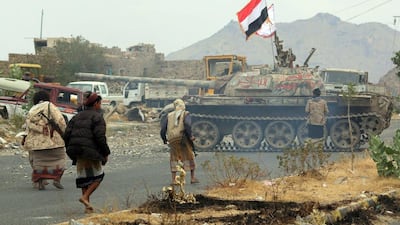ADEN // Huda Tareq was used to being spoiled by her parents, both educated professionals, and her five older brothers.
Growing up in Taez Hadad, a town about 60km from Taez city, the 13-year-old schoolgirl always had more pocket money than her classmates to buy snacks, soft drinks and sweets.
But all that changed in September last year when her parents - both public-sector employees - stopped receiving their government salaries.
Huda eventually fell victim to a sexual predator who exploited her family’s economic hardship, brought on by the ongoing war in Yemen.
Taez province became one of the main battlegrounds in the civil war that broke out after Houthi rebels seized the capital, Sanaa, in September 2014.
Two years later, in September last year, president Abdrabu Mansur Hadi moved the central bank from Sanaa to Aden – the temporary seat of his government. Only state employees in government-held areas have been able to receive their salaries since.
Huda’s father Omar, a school teacher, and her mother Efrah, a nurse at a nearby government hospital, stopped getting paid and could barely afford the family’s basic necessities, let alone the small luxuries Huda was used to.
“Huda hated going to school, because she thought she did not have suitable shoes and pocket money and sometimes she did not have any notebooks,” her mother said.
About two months after her parents’ salaries stopped coming, Huda came home from school one day wearing new shoes and clothes, and with pocket money. Asked where she got these things, Huda told her parents that her aunt had been generous.
“One of my sisters is rich and she used to provide us with some needs, so I believed Huda that my sister helped her,” Efrah said. “I did not think that my pampered daughter was lying.”
One month after Huda started coming back with new things, she told her mother that she wanted to spend the night at her aunt’s house, as she sometimes did, and Efrah agreed. But Huda did not come home the next day and her parents found out she did not go to school either.
“I asked my sister about her. She said that she had not seen Huda for a month,” Efrah said. “I was shocked, and we immediately notified the Al Shimayateen district police station.”
The police questioned Huda’s teachers, classmates and anyone else who knew her, but they could not find her.
After two days of searching, neighbours found Huda’s body and her school bag floating in the village dam.
“The signs of rape were clear on Huda’s body, and this is what the forensic examination confirmed,” Efrah said. “Then we realised that a man who had been giving Huda presents had raped her and then killed her to protect himself.”
Jamal Al Shami, president of the Democracy School, an NGO in Sanaa which does advocacy work for children, said the economic hardship caused by the war had created an environment in which children were much more vulnerable to sexual predators.
“The economic crisis has had a negative impact on children on several issues, including harassment and sexual exploitation, but there are no figures regarding this yet,” he said.
The police detained and questioned several young men suspected of raping and murdering Huda, but so far they have not been able to find any evidence and no one has been charged.
Huda’s family buried her in December. They hold out little hope of the authorities being able to provide closure and justice, at least in this world.
“The criminal could escape now,” Efrah said. “But he cannot escape the afterlife, and Allah will punish him.”
foreign.desk@thenational.ae
* With additional reporting by Mona Mohammed in Taez

